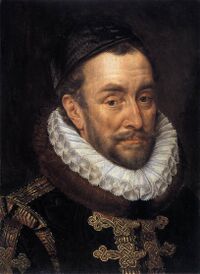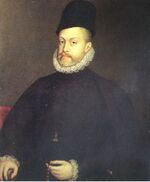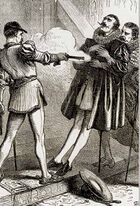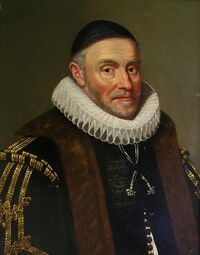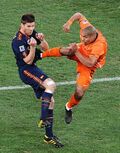William the Silent
“....”
“.........”
“...............”
William the Silent[1] (24 April 1533 – 10 July 1584), Prince of Orange[2], Marquess of Squash and First Juicer of the Netherlands, lead the Dutch breakaway from the Spanish Empire in the 16th century. He is famous for not talking to the press or advisers or family or friends, or telling anyone what he thought about them.[3]
This non-verbal approach to leadership was unusual even for those times. Indeed, the notion of privacy was alien in societies where peasants lived in the same shed as their livestock and the rich were waited hand and foot by an army of servants. William preferred his own company and would communicate via facial movements, finger pointing and scraping his boots on the floor. The most he would ever say would be an utterance from his mouth region, usually "hmmmm" or "hurrrmm." Some view these as verbal articulations and suggest that William's name should be "William the Almost Silent," but that argument is for the pedants only. All told, William just said nothing that could be constructed as a simple "yes or no."
Yet the question remains: Was William born silent? When he got his first smack on the bottom to check that he was a live birth, can we be sure William never said anything?? Did he have a tongue defect??? William, when asked, would always reply (by paper) that he could speak but that it was his business whether to talk to anyone else.[4]
To this day in the Netherlands, the Dutch hold a five minute silent vigil at the grave of William on the anniversary of his death. In years past this silence was observed across the country, but with the noisy impact of Facebook and Twitter, the Dutch appear to be abandoning this mark of respect to a great leader.
The World is My Orange[edit]
The future Dutch hero was born in Germany. His family lived in Nassau, a pokey little state which was then part of the Holy Roman Empire. William was the eldest of 12 children, so life in the family castle was very squashed and fractious. Already then William's refusal to speak earnt him the family nickname 'Billy No Words' and later, 'William the Silent.'
Then in 1544 there came a chance to travel when a distant cousin who was Prince of Orange, a minuscule statelet in Southern France died and left all his fruity estates to his relatives. William was posted to Orange to claim the land but had problems communicating. The gestures and faces he had used in Germany to ask for things to be done were not understood by the surly French. William was reduced to leaving messages on pieces of paper to make sure even his home was cleaned and his clothes delivered from the laundry.
Marital Silences[edit]
William didn't stay in Orange long, he developed an aversion to the French which would later complicate his policy decisions when leader of his country. What language(s) William understood is a bit contentious. His biographers claim William could read and write in Flemish but would often leave instructions in a mix of languages just to confuse everyone. This was perhaps a further attempt to develop William's mystique.
Since the Netherlands (including then Belgium and the Netherlands) were part of the Holy Roman Empire, William gained employment working for Emperor Charles V. The Habsburg emperor liked 'Mr Quiet' and recommended that William get a good job offer. Meanwhile, William acted as Charles's human crutch, supporting the gouty emperor as he travelled around his empire and listening him blaming Martin Luther for his ills.
When Charles abdicated, the Netherlands became part of the Spanish Empire. Charles's son King Philip of Spain also admired William's taciturn nature and appointed the 'Orange Man' as 'Stats Holder'[5] of Holland, Zeeland and Utrecht. Since Philip would always be short of money[6], William's duty was to 'squeeze the tax dodging Dutch pips.' At this stage William agreed to that policy, he saw the importance of money.
William's notorious reticence appeared to be no barrier to marriage. He got through three wives when he was alive and left the fourth a rich widow when he died. William's most 'difficult' marriage was with wife number two. Anna of Saxony was provided with a CV that read '"self-absorbed, weak, assertive, and cruel". She seemed ideal for William, though the description should have added 'sex addict and mad'. Certainly five children proved the former and later behaviour would establish the latter, though in her defence, William's refusal to talk was an added provocation to the unhappy marriage. Anna eventually asked for separate residences and couldn't stand living in the Netherlands. She moved to Germany, had an affair and a child by her financial advisor Jan Rubens, father of artist Peter Paul Rubens and his quivering fleshy nude paintings. William wrote down a note that simply read 'relieved'. He now had something else to keep him occupied.
Rebellious Silence[edit]
William the Silent was finding it hard to collect money for the Spanish king. Philip now added another pet dislike to tax dodgers - protestants. He offered William free firewood if he could root out and burn any heretics who were declining to go to Mass every Sunday.
Since William had always let other people do the talking, his own religious preference/prejudice wasn't clearly known[7]. Philip believed William had been a Catholic when in France. Perhaps he should have asked William directly but wouldn't have got an answer.
The Dutch and Belgians were now very unhappy with Spanish rule and joined together to rebel. This wasn't a religious uprising but one that was all about taxation. Philip was spending millions of pesatas on making Madrid into a capital city to be the centre of his empire but it meant everyone else to pay through the beard to do it.
From Antwerp to Amsterdam the revolt took hold. Spanish tax collectors were killed, their ledgers and receipts burnt. William stayed silent, neither helping the rebels or destroying them in his own provinces. Philip now sent a new governor for all of the Netherlands, a brute called the Duke of Alva. He executed the leaders of the rebellion and gave license to his soldiers to attack everyone who looked superior. William was still Silent but now with the death of all his rivals, William was the undisputed rebel leader.
William The Silent Speaks Out... Not[edit]
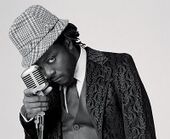
In Amsterdam, the local press reported that at last William the Silent would speak to the crowds. On the day, he appeared on a stage, dressed in a black suit and a black hat. For many there, it was the first time they had seen William. Would he speak? No. Someone else came up to speak to the crowd, dressed as a marionette and wearing a pair of large wooden clogs.
......1-2....1-2....1-2........cough...is the microphone on..? Good burghers of the Netherlands. Prince Will._I_.Am of Orange, Marquess of Squash and First etc....cannot speak today as he has a bad throat but I am here to deliver his message. It reads 'Don't Talk to the Spanish, Keep Your Thoughts to Yourself and I hearby urge everyone to reject King Philip of Spain as our ruler.
William rapped the the wooden stage with a large walking stick as his points were put across. Later pro-Spanish commentators said that the reason William didn't speak was that the devil had taken his tongue and was using it in hell to pleasure his minions.
Silence Produces Results[edit]
Inspired by William's non-speaking role, the Dutch fought back against the Spanish. Using their ability to build better ships, the Dutch chased the Spanish fleet away. When the Spanish army got too close to Amsterdam, the famous Dutch dykes were deployed. Their open displays of same sex affection and lack of under draws drove the Spanish army mad. Most headed for the water and drowned in their armour.
The Duke of Alva was replaced and a new commander, the Duke of Parma given control of the Spanish army. Parma saw that the Catholic Belgians could be prized from their Dutch Protestant allies with a mix of bribes, flattery and free ham. William sent messages urging resistance but the Belgians were fed up with the war and wanted to be left alone by everyone. Especially the Dutch.
Now encouraged by this victory, King Philip personalised the struggle. He believed if William could be silenced, he would win back all his lost territories. This called for something drastic. Spain put a bounty on William.
King Philip now declared the Orange leader 'Bandit One' and offered a collectible set of Spanish Pieces of After Eight as a prize to have William shot. If they could get William to talk before he died, the prize money was doubled.
The Silent Silenced[edit]
For the next few years William the Silent avoided anyone he didn't know but stayed in the public eye, his long silences taken by his fellow citizens as proof their leader was thinking deeply about his next move. The war had become deadlocked, the Dutch dykes had stopped the Spanish but had ruined the fields. Only help from outside by Queen Elizabeth I and some of William's family in Nassau kept the cause going.
In 1584 William was finally tracked down by a Spanish paid assassin. He was Balthasar Gerard, otherwise known as Balthasar the Hero (in Catholic Europe) and Balthasar the Jackass (in Protestant Europe). A ruthless killer[9], a bloody assassin from the Spanish-held Franche-Comte region of France, Balthasar hated William because he was in love with Philip. He took the reward money and moved secretly to Amsterdam to find his quarry.
Bathasar discovered William liked to take a long bike rides by himself so that he didn't need to talk to anyone. One day, as Willian was cycling alone around Amsterdam, Bathasar rode up behind him and fired a flintlock into the Silent's ear. In a cry that could be heard all around Holland, William finally broke his Silence.
ARGHHHHHHHH!
Fatally wounded, William rode his cycle into a canal. People rushed out to help and fished him out. William was dying and made a sign that he was now 'off'. Everyone knew it had to be William, a notepad was discovered with his initials and a lot of scribblings about his plans to beat Spain were found.
The Dutch press re-wrote the assassination so that it happened in a house and now have a plaque on a staircase where William the Silent was supposed to have died. All lies of course.
Dutch Not Very Tolerant Then[edit]
Balthasar the Jackass tried to slip away but was captured. Perhaps he should have not been surprised what would happen to him if he couldn't get away but even he would not have expected the punishment the Dutch had planned for him. After all, William wasn't a king or emperor, just a prince of somewhere that grew oranges.
In summary, Balthasar's extended punishment involved: whipping, honey coating, having his body licked by a goat, weights hung on his big toes and left tied to a pole to have things thrown at him. Then his feet were squeezed in boots too small for him, having those roasted over a fire and then take them off, with Balthasar's feet still inside. Finally he was splashed over in alcohol, covered in hot animal fat, his right hand burnt off and his body cut into quarters. His heart would then be torn out and only finally, would Bathasar lose his head. This is just a reminder that when it came to bizarre punishments, the Protestants were just as good as the Catholics at devising cruel ways to die. Of course much later, talent and reality shows were to follow much of this blue print except you wouldn't die. This has now been corrected by the recent appearance of the The Hunger Games.
Bathasar the Jackass said nothing as he went all through this, his Dutch body manglers evidently missing the irony of all this. Perhaps only William the Silent would have appreciated the joke.
Silent as the Grave[edit]
The Dutch buried their leader with a garland of flowers and a bottle of his favourite grolsch. William's son, Maurice the Mouthy became leader. There were further battles but the Spanish decided to defeat the Dutch by conquering England! One Spanish Armada later...
When the Dutch finally won their freedom, they associated William and the colour orange as their liberation symbols. William's murder by Spain meant that even today when the two countries meet each other in a contest, the memory of William's murder is always brought up again. The last great flare up was in 2010 at the World Cup Final. The passions were the same but the Dutch lost this time lost. Even William would have found it hard to stay silent at that game.
Silent References[edit]
- ↑ Willem de Swinger in Dutch.
- ↑ William the Silent is not the same person as William of Orange. William of Orange was the King of Oranges. As the king, he loved all oranges equally but held contempt in his heart for Steve of Apple. He actually coined the commonly used term, “It’s like comparing apples to oranges.”
- ↑ But he did keep notes. See below.
- ↑ It's an answer Harpo Marx is said to have used when he was asked the same question in the 1930s.
- ↑ Chief Accountant in English.
- ↑ Remarkable when Spain owned most of the Americas, the boot of Italy and bits of France.
- ↑ William had been brought up as a Protestant but went Catholic when running Orange. After that no one really knows. He could have been a scientologist.
- ↑ Joke as used in Shrek and Voyage of the Dawn Treader.
- ↑ Are there any other types?
